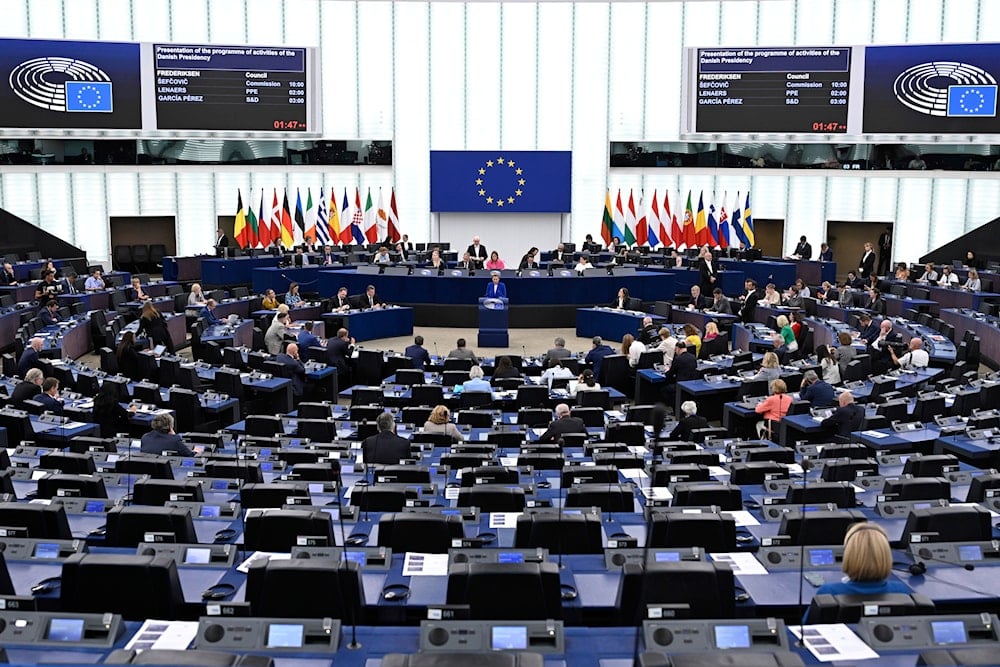EU employees protest bloc's stance on Gaza
EU civil servants in Brussels clash with the Commission over "Israel" policy, citing Gaza war crimes and urging action on human rights.
-

Denmark's Prime Minister Mette Frederiksen delivers her speech as Denmark holds the rotating presidency of the Council of Europe, Tuesday, July 8, 2025, at the European Parliament in Strasbourg, eastern France. (AP)
EU civil servants in Brussels are increasingly clashing with the European Commission as tensions rise over their demands to publicly challenge the bloc's position on "Israel", in an internal dispute that has intensified recently as staff push back against restrictions on their freedom to demonstrate.
A rising number of staff members contend that the bloc’s inability to apply pressure on "Israel", despite war crimes in Gaza, creates a situation where they cannot carry out their responsibilities without violating both EU and international law.
An official, who requested to be identified only as Ramona due to concerns over professional consequences, told Politico that EU institutions have effectively forced employees into a position of "complicity," breached their "moral and legal obligations," stifled conscientious dissent, and postponed substantive action.
The EU’s diplomatic arm has accused "Israel" of breaching human rights obligations under their trade agreement, suggesting the suspension of favorable trade terms and exclusion from the Horizon research program; yet European leaders remain divided on taking action, fueling criticism that Brussels is neglecting its own treaty commitments.
The Commission asserts that foreign policy falls under national governments' authority and has cautioned staff against political engagement, with spokesperson Arianna Podestà dismissing the internal backlash over EU-"Israel" ties as politically charged, while emphasizing employees' duty to remain impartial, loyal, and neutral in fulfilling their obligations.
Futile internal channels
Podestà stated that while EU civil servants can voice concerns through internal channels, such as formal letters, discussions with staff unions, or dialogue with managers, she emphasized that the workplace, official premises, and government-provided resources should not be used for activism, whether in support of or opposition to political causes.
Critics, however, challenged the effectiveness of the internal channels mentioned by Podestà, noting that protesters had already exhausted many of these options as their initial recourse.
Since July, around 1,500 EU officials, from junior staff to senior advisors, have signed an open letter warning of worsening famine in Gaza and urging the bloc to pressure "Israel" to allow more aid. Some are now weighing strikes to push for stronger action. However, unions remain divided, and protesters fear legal and professional risks, though some argue such action could be justified as enforcing the EU’s human rights obligations.
An internal letter from the group EU Staff for Peace, obtained by Politico, accused EU leadership of intimidating pro-Palestinian protesters through tactics like physical altercations with security, contract terminations, and suppression of petitions.
The letter cited an incident where seven officials wearing "Say no to genocide" shirts were forcibly removed from a canteen, one allegedly manhandled, another forced to delete protest footage.
It also raised concerns over unrenewed contracts, a banned pro-Palestinian survey with 1,514 signatories, and the controversial presence of Israeli Colonel Moshe Tetro, accused of war crimes, in the Commission headquarters.

 3 Min Read
3 Min Read










